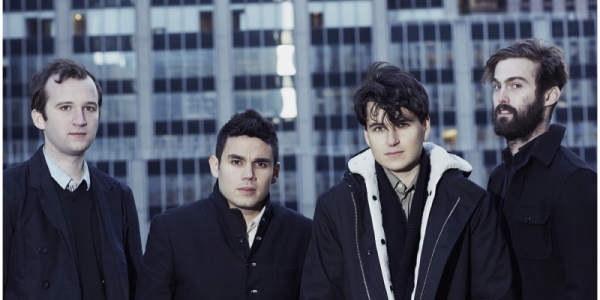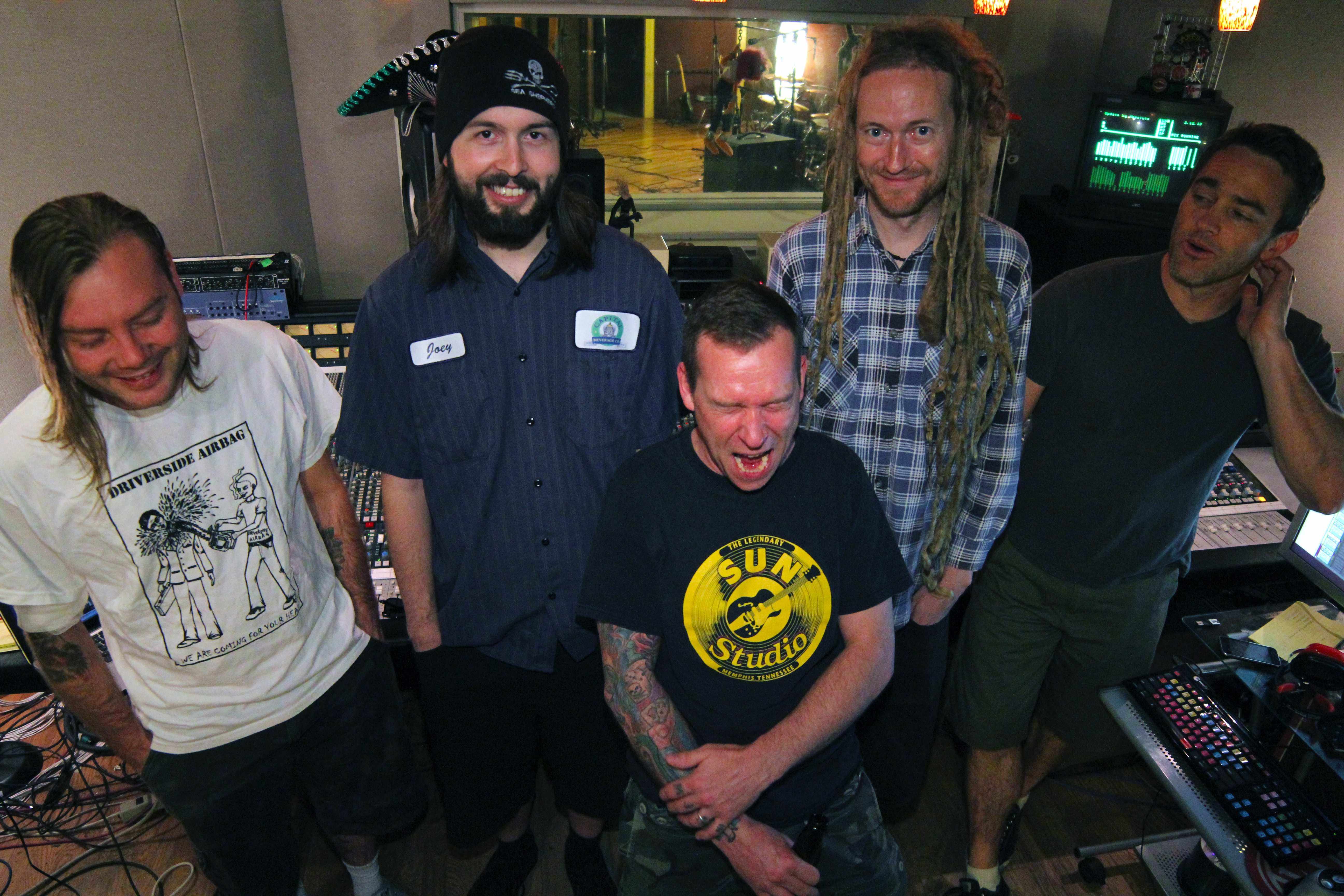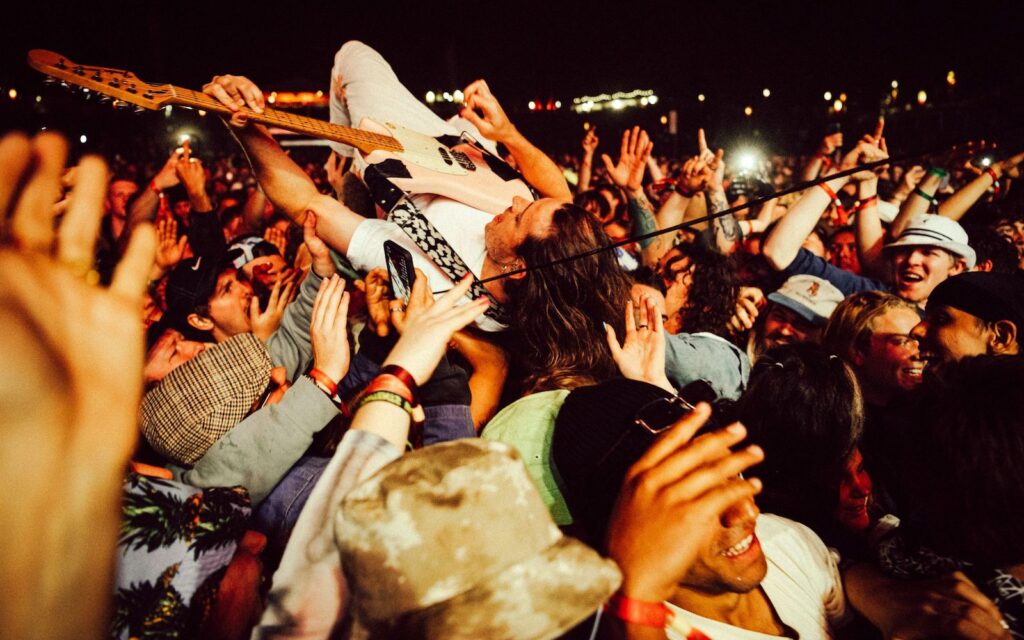In the clip, it’s Rostam who first cracks the stoic facade in the face of Buscemi’s madcap antic with a relinquished chuckle. As for the SAAB ‘controversy’ (Vampire Weekend seem prone to the most benevolent of controversies), Rostam is sternly dismissive. “We just wait for certain things to blow over, as they inherently will. Certain websites are seeking hits, and they’re looking to us to procure them. We don’t let that affect us too much.” I offer that the exposure would perhaps benefit the band, no matter how trivial. Rostam doesn’t agree. “No, no. I don’t see it as beneficial. I see it as a nuisance. I understand it.”
As for the pressure of completing a hat trick of studio albums, following on from the success of their self-titled debut and second LP Contra, Rostam is assured. “I like it, I like the album. I’m not worried about it on any level. There’s only so much that you can worry about, at some point you have to let it go.”
The songwriting partnership between Rostam and lead singer Ezra Koenig is taken to another level, with Rostam’s classical-leaning pop smarts and Ezra’s savvy lyricisms converging to achieve their most accomplished material to date.
“There’s definitely a bouncing-off that distinguishes the writing process. Pretty much every song was written either with me making a piece of music and sending it to Ezra and him writing vocal melodies and lyrics on top of it. Or, with him coming in with music and lyrics and the two of us fleshing out the arrangement together. Then later on we would bring in Ariel Rechtshaid, who co-produced the album with me, and our drummer Chris [Tomson] and bass player Chris [Baio]. That was the process for most songs, but maybe there’s an exception or two in there.”
While Vampire Weekend’s most well-known hits embrace sharp, clean guitar licks, Modern Vampires Of The City shies away from the pop-punk bombast of their earlier work with a spacious, stripped-back ethos. “That’s one thing that was a governing principle, minimalism. I don’t think the short punky-pop songs defined the previous albums. If you look at the singles, then you might get that impression. But I feel like the albums are much more diverse than punky-pop songs. I guess it depends on how you look at it, at the end of the day.”
The first taste of the new album came in the simultaneous release of Diane Young and Step. Diane Young features Ezra performing an Elvis-like croon over an up-tempo rock‘n’roll number, conversely Step is slow-burning and contemplative. Releasing two disparately styled tracks was a calculated ploy at misdirection, as Rostam explains. “We like this idea that nobody could pigeonhole the sound of the album, because it’s a pretty diverse album. We liked the idea that there was no way one song could define the record.”
Though there are many strikingly intimate moments throughout their new release, tracks such as Unbelievers reach a scope befitting of their festival-headlining capabilities. The strive for stadium-sized histrionics is not a motivated one. “If we are, then we’re doing it in a pretty risky way,” Rostam offers. Unbelievers is a song that’s about living in a world that is inherently conceptual, where the believers and non-believers have to coexist. The song doesn’t reveal a tidy prescription as to how that coexistence can come about. It’s more simply just describing that world. To answer your question, that doesn’t really aspire to a stadium rock sound. But maybe there is something subconscious that’s pushing us in that direction.”
Contra was bristling with a sunny strain of pop, most evident on the chirpy Holiday, embracing distinctly Californian qualities from a distinctly New York band. Modern Vampires Of The City, however, is a New York artefact through and through. “It’s possible that we’re influenced by the fact that our second album was written after travelling so much, and then we came back to New York and relocated for our third album. Well I shouldn’t say relocated, what I mean is that we gathered ourselves a little bit and nested ourselves well,” he recalls. “I think that our version of New York is pretty unique to us. Our version of American music is that way too. It’s not actually something that we had to think too much about, it’s something that happened pretty organically.”
After the subversive use of autotune on Contra cut California English, Ezra’s vocals are once again manipulated to the extreme on Diane Young. “It’s a natural desire. Since we’ve been working on music together, we’ve always experimented with vocal manipulation. I’m talking years before the band began,” Rostam recalls. “In the case of Diane Young, we felt like that section had an interesting arrangement and that the songwriting was strong, but we wanted it to have one more element that was interesting to listen to.”
When Rostam and I last spoke at the start of the year, ahead of the band’s Big Day Out appearances, he stated that he was in the process of securing rights for the new album’s cover art. The finalised art features a smoggy 1966 New York cityscape photograph by Neal Boenzi, complementing the album’s contents greatly. “Yes, we did secure the rights for it. It was touch and go for a second, but we did get it. And I’m very happy that we did. I think that something that we realised was that this whole album could be thought of as a city in itself,” Rostam muses. “That was something we realised after the fact, the album cover was already there at that point. It feels like to us that there was an invisible hand guiding our decision-making.”
The scope a cultural references and nods of acknowledgement contained within Modern Vampires Of The City is mind-boggling, neatly marrying biblical allegories and callbacks to long-forgotten rap hits of the early-‘90s. “We like the idea that our music expresses what we’re interested in. We’re not just interested in classical music, or just interested in the bible, or just interested in rap. We’re interested in all of these things, and we think that it’s fitting to make an album that references them all. We wouldn’t be true to ourselves if we didn’t.”
When I raise the prospect of people feeling uncomfortable with an appropriation of different cultures, Rostam retorts with a measured umbrage. “We would never say that we appropriate anything. The history of all art – if you wanna use that word that way – is appropriating other cultures. That’s the history of all creativity. I think it’s pretty ignorant when people use that word that way.”
Having produced an established canon of their own, along with a pronounced – somewhat divisive – aesthetic, is it that Vampire Weekend have reached a point where they can become self-referential? “I think the answer to that question isn’t very highfalutin – it’s yes,” Rostam concurs. “We don’t want to repeat ourselves, we are conscious of that. Songs are powerful, evocative things.”
As for the somewhat bizarre prominence of Steve Buscemi in Vampire Weekend’s lead-up to the new record, Rostam is, perhaps a little bit sardonically so, thankful for the added Hollywood lustre. “In some ways, we sort of found each other. Chris Baio discovered that he and Steve were related, and Steve wanted to help us out of the kindness of his heart. He felt that we weren’t altogether successful in promoting ourselves and wanted to throw some light on the process, if he could. To shine down on us, give us some loving.”
BY LACHLAN KANONIUK







